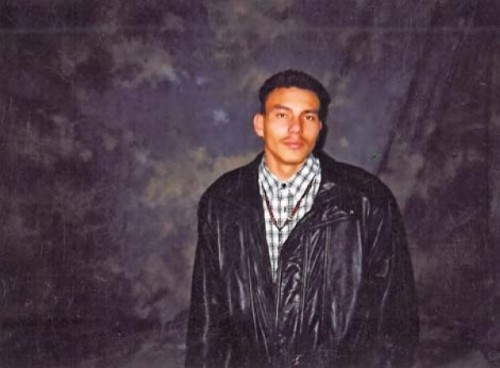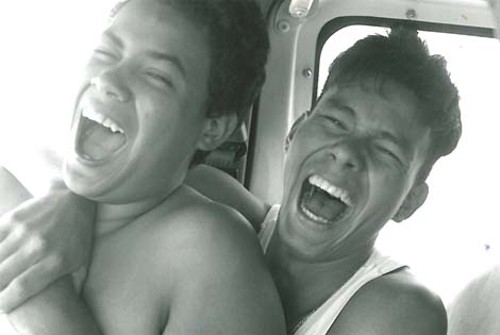Dead End
The one life anti-gang activist Jose Hernandez couldn’t save was his own.
By Stephen Dark @stephenpdarkAs the final seconds of Jose Hernandez’s life trickled out with his blood as he lay on the ground in Mexico, his last thoughts may well have been of Utah. He had just told his girlfriend he was leaving her and returning to Utah before she cut his throat. Utah was where Jose and his mother, Maria, brother Miguel and sister Gloria came to settle illegally when he was 10 years old. The west valley of Salt Lake County was where he would do most of his growing up in gangs, in detention and finally in county lock up. Utah was where Jose’s mother would stunningly walk out on him and his siblings, and from where Jose would be deported twice by the time he was 26.
Utah was also the place where Jose had met, through the Boys & Girls Clubs, 66-year-old Walt Hunter, one of a few caring souls who took an interest in Jose and tried to steer him clear of gangs. Salt Lake City was where Jose discovered the cathartic release of poetry and the spoken word. It was here Jose’s school counselors began to see a change in the gangbanger and believed he might escape the clutch of gang life. Jose began speaking out against gangs and, for this trouble, was eventually jumped by four inmates in his cell in the Weber County Correctional Facility in Ogden after one called the then 23-year-old a “punk bitch,” and lured him into a fight.
According to a prison report about the attack on Aug. 14, 2007, one of the assailants “shanked [Jose] in the nose with a pencil” in an attempt to pierce his brain. Blinded by blood, Jose shrugged off his attackers, pulled out the pencil and staggered to a bathroom to wash the blood from his eyes. His assailants fled when Jose’s “homies” came in from a game of handball in the recreation yard.
The four attackers, also gang members, had keyed in on Jose because he was giving twice-weekly poetry workshops at the prison to encourage young gang members to leave gang life. “I can’t think of a more dangerous place to conduct impromptu gang-prevention classes,” Hunter says.
Jose was transported to a hospital “due to the severity of his injuries,” according to the report, and a doctor removed a piece of graphite close to his brain. When Hunter visited Jose, the hospital room was only dimly lit. The young man lurched up from his bed, his hands reaching for his friend as he pleaded with him, “Tell me what I look like.” The young man’s face was grotesquely swollen with blue-green contusions, Hunter recalls.
Being undocumented with a rap sheet put roadblocks in front of Jose’s attempts to build a life in a country he had come to realize did not want him. How his life slipped through the cracks of an, at best, indifferent system is not a surprise to the many who knew him. But for the many who loved him, his death marks the loss of, as Hunter says, “an ambassador for these kids who have no voice.”
NO COUNTRY
Jose once told Hunter, “I’m not an alien. I’m not illegal. They don’t accept me here. They don’t want me in Mexico. What I am is a kid without a country.” Hunter says Hispanic parents bring their children illegally to the United States at an age “when the kids don’t have a choice. Then, after being allowed to participate through high school, after seeing other kids living the American dream, suddenly, when they turn 18, all support ceases.”
In 2004, Jose made a five-minute video to raise funds for a documentary about his life. In it, he made several claims—notably that he went to prison as a minor—that are questionable. Yet his life hardly needed dramatizing. Beaten at age 14 into joining La Raza, one of a number of local versions of California and Chicago gangs that now operate in Salt Lake City, he risked his life to later leave the gang and work with at-risk kids to steer them away from gangs. He struggled with feelings of abandonment after his mother abruptly walked out, feelings that Sonia Orozco, a gang-prevention officer at Jordan School District who worked with him, says are all too prevalent among undocumented teens. “There are so many Joses out there, who are thrown away like trash by their parents,” Orozco says. “And then these kids turn to what they can find to survive—gangs, drugs, life on the streets.”
Anti-gang activists, artists, counselors, friends and family and describe Jose as a charismatic, natural leader. His former therapist, Gabriela Cetrola, says that Jose often talked about his criminal past to hundreds of children in classes and social clubs throughout the Salt Lake valley to dissuade them from following in his footsteps. “I always wondered about him, where he was,” Orozco says, in tears, upon learning of his murder. “Nobody cares for these kids.”
Jose is also never far from Walt Hunter’s thoughts. Jose shared a dream with him in which he and Hunter were standing on a second-floor balcony of a club they’d created for at-risk kids. “It’s our place, it’s for kids without a country,” Jose said of his dream. “We made it, Walt. It’s going to happen.” Hunter says that despite the death of the young man he mentored, opening a club for kids like Jose “is still a goal for me. I cannot believe how these kids exist, under the circumstances they do, the totally hopeless situation, and yet they still have hope. How does that happen?”
MOMMIE DEAREST
Jose was born on March 5, 1984, in Uriangato, Guanajuato, Mexico, to Maria and Gabriel Lopez. Relatives say that Jose’s parents fought bitterly, to the point where his mother decided to leave her husband for the United States. She secured false papers for herself and two of her children, Miguel, then 6, and Gloria, age 3. Lopez hired a “coyote” to guide her older son, Jose, then 10, across the border and meet them at a McDonald’s in Nogales, Texas. The first time Jose tried, he almost drowned, he told Hunter. The second time, border patrol agents arrested his coyote. The third time, he made it across, alone.
Gabriel Lopez pursued his wife and children to Salt Lake City, where Jose’s grandmother had taken up legal residency several years earlier. He moved in with his wife and children, although both Miguel and Gloria acknowledge their mother was abused by their father. A year after Gabriel moved in, his wife abruptly left, moving in with an employee at a restaurant where she worked.
Cetrola says Jose “grew up by himself,” and found in La Raza a family. He was jumped in to La Raza at the age of 12 because, Miguel says, he needed a place “to show his strength, his anger, his sadness.” But “Chuy,” an undocumented former gang member and friend of Jose’s, says joining a gang is sometimes the only choice available. When Chuy was 12, his mother was deported. His brothers told him unless he “worked,” he would be sent back to Mexico, which he had left as an infant. He joined a gang and made money by dealing drugs, which allowed him to pay rent to his siblings. “Sometimes [gangs] are not the best choices, they are just the ones you have,” Chuy says.
Jose attended Eisenhower Junior High School in Taylorsville, where he was infamous for carrying around an attaché briefcase that he later claimed contained drugs, money and a handgun. Gloria would come home from elementary school and find paraphernalia in the house or Jose using drugs.
Eisenhower’s resource aide, Cristine Spendlove, met Jose when he was in a reading program in seventh grade. One day, Jose came to school sobbing because he had run into his estranged mother on the street and she had refused to acknowledge him. Spendlove says that was when she saw the real Jose. “He was so lost, he was just trying to fit in.”
Jose was eventually expelled from Eisenhower, although whether because he was high, selling drugs or threatening a teacher isn’t clear.
In December 1999, Jose, then 15, and three other youths were charged with kidnapping a teenage girl and sexually assaulting her in a van before releasing her. He was sent to a detention facility, although it is unknown for how long. It was a crime that therapist Cetrola says Jose was remorseful about and one for which, in his subsequent evolution into an anti-gang activist, he sought redemption.
In a notebook, Jose wrote about his life as an incarcerated minor. The only place he could let his fear show was in the showers, where he would “start crying so they wouldn’t see me crying because of the water.” He later shared this story during gang-prevention lectures at a local junior high.
Miguel saw his older brother grow up into two men: One was Jose, who loved his family; the other was Flaco [the thin man], whose features were a mask that revealed no emotion. Incarceration, Miguel says, helped Jose make sense of things, to understand that he was, “all alone, in the belly of the beast.”
Jose also put his feelings into poetry, an art form Hunter introduced him to in 2001 when they met at a poetry workshop given by the at-risk youth counselor at Valley Mental Health’s Adolescent Residential Treatment and Education Center [ARTEC], a locked-down transition program for youths getting out of incarceration.
“Poetry is the truth,” Hunter told Jose. “Write the truth, and you’ll end up with a poem.” Jose’s truth, his first poem, was “I Stand Alone.” Matt Bradley, a former SpyHop manager who encouraged Jose’s artistic ambitions, says he “poured his heart into his poetry, all his hopes and dreams.”
More by Stephen Dark
-
Call it a Comeback
Long mired in economic depression, Midvale’s Main Street dusts off its small-town charm.
- Sep 20, 2017
-
Love Letters
Correspondence between a young woman at the Topaz internment camp and her beloved sheds light on Trump's America.
- Sep 6, 2017
-
Triggered
Veterans Affairs exists to help vets. So why did the Salt Lake VA appoint an anti-veteran chief?
- Aug 30, 2017
- More »
Latest in Cover Story
Readers also liked…
-
Forget the family pedigree—Robert F. Kennedy Jr should not be the next president of the United States
Trojan Horse
- Jun 21, 2023
-
Women decry harassment and toxic culture at St. George auto dealership
Men at Work
- Oct 11, 2023






